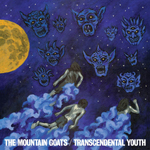|
|
 |
Dusted Reviews
Artist: The Mountain Goats Album: Transcendental Youth Label: Merge Review date: Oct. 1, 2012 |

|
|
|
 |
John Darnielle, the clever and prolific singer-songwriter behind The Mountain Goats, has been at it for roughly two decades. From the mid-1990s through the present, he’s proven himself to be more than just a fine, über literary lyricist; he’s also established himself as one of the more affecting, mature and consistent singer-songwriters whose nerdy tenor still can’t help but evoke the aesthetic universe of extended adolescence — however old and emotionally wise he’s become over the years. Although his discography has become more serious, personal and adult-themed, and taken on a higher fidelity sound to boot, his unabashedly wordy and nasal vocals seem fated always to position him alongside acts like The Decemberists and Neutral Milk Hotel, whose works were once tour-de-force soundtracks to the clever, quaint, overwrought and solipsistic emotions of millennials struggling to grow up.
So even if it weren’t for the pointed title of The Mountain Goats’s latest full-length, Transcendental Youth, one pertinent question would be obvious: Is Darnielle’s music still alive for those who once might have cherished it, and if not, does it retain enough sparks (or growing pains?) to usher into The Mountain Goats’ back catalogue members of the newer generation passing through turbulent youth? The songs that make up Darnielle’s new set are consistently tight and melodic and even include a triumph or two. Still, even putting aside the weight of generational time, Transcendental Youth isn’t close to the highest of Darnielle’s own standards. He seems to have aged and studio-sheened his way into a sound that is neither as visceral as that of his records past nor rid of their not-always-successful tight rope act between relentless earnestness and cloying self-seriousness.
Though it’s hard not to hear in them pale impressions of bona fide classics (whether Darnielle’s own searing “This Year” or Elvis Costello’s “Oliver’s Army”), the anthemic piano pounds of “The Diaz Brothers” have enough momentum to steamroll the anxiety of listeners with a low tolerance for heart-on-sleeve singer-songwriting. Just a notch below is the horn-filled “Cry for Judas,” which employs the well-tested technique of pairing joyous, energetic sounds with depressive words (“Speed up to the precipice / And then slam on the breaks / Some people crash two or three times / And then learn from their mistakes / But we are the ones, who don’t slow down at all / And there’s, nobody there, to catch us when we fall / Long black nights / Morning frost / I’m still here / But all is lost”). On the other hand, such peaks are complemented (but not complimented) by troughs such as “Amy, aka Spent Gladiator 1,” “Harlem Roulette,” and “Spent Gladiator 2” — all rollicking, but directionless and tedious.
More typical than those highs and lows are the pleasant, occasionally even charming numbers that glide by without making strong impressions. Ultimately the album adds another respectable line to The Mountain Goats’ discography. What it doesn’t do, however, is explain why many listeners once justifiably did — let alone might yet still — take The Mountain Goats to heart.
By Benjamin Ewing
|







